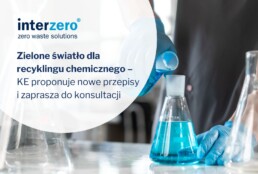Green light for chemical recycling - EC proposes new rules and invites consultation
8 July 2025. The European Commission has launched a public consultation on a draft implementing act that will set out rules for calculating, verifying and reporting the chemical recycling content of single-use plastic beverage bottles (SUPs). In addition to YES to chemical recycling, the EC has also said NO to recyclate from waste collected outside the EU - from 2025, it will not count towards the 25% recyclate target for PET bottles.
Yes to chemical recycling in PET plastic bottles
The draft proposed by the Commission for the first time allows raw material treated by chemical recycling methods to be counted to meet the ambitious targets set by the SUP Directive. Its provisions oblige producers to use recyclates in PET bottles - from 2025 their content must be min. 25%, and from 2030. - 30%.
The new regulations aim to complement the current methodology for calculating the recyclate content of mechanical recycling. Due to its lower environmental impact and energy consumption mechanical recycling will continue to be the preferred treatment technology for plastics waste. Chemical recycling, on the other hand, will find application in situations where mechanical methods cannot be used or where a higher level of purity is required - such as for food packaging.
New methodology for calculating recyclate content
According to the draft, the share of recycled plastics in SUP bottles is to be counted as the ratio of the weight of the recyclate to the weight of all the plastic parts of the bottle placed on the market in the Member State concerned. This means that to the weight of beverage packaging introduced will include not only the bottles themselves, but also their caps and labels (traditional and sleeve type). Provision is also made for data correction in the case of import, export or movement between EU countries.
Entrepreneurs will additionally be obliged to report the weight of plastic packaging and the share of recyclate in the different parts of the bottles on the basis of the declaration of conformity. Verification will take place on an annual basis (or every three years for SMEs) and responsibility for data compliance will rest with the entrepreneurs and the national control authorities.
The "no fuel use" principle
The new methodology for calculating the chemical recycled content of PET bottles is based on the principle of 'fuel-use exclusion'. This means that waste treated for fuel production or energy recovery must not be added to the recycling balance. Only those fractions that have actually been turned into new recyclables will be counted.
It should be recalled that chemical recycling technologies make it possible to convert plastics not only into new plastics, but also into fuel (e.g. pyrolysis, gasification). Find out more about chemical recycling methods and technologies >>
Changes for investment and increased competitiveness
The establishment of clear criteria and unambiguous definitions is intended to create a a level playing field for all players in the EU market and ensure greater legal certainty and stability for investors. We are, of course, referring to investments in new chemical recycling plants and technologies, which have so far been held back due to a lack of sufficient regulation. The proposed legislation is part of a broader action plan for the EU chemical industry, which aims to increase the competitiveness of the sector and its sustainable transformation. They also provide opportunities for the wider use of recycled chemical plastics and the development of the industry across the EU.
The Commission further points out that the development of a common methodology is important to further reduce landfilling and incineration of plastic waste and the promotion of a circular economy.
Restriction - EU recyclate only until new legislation is adopted
In parallel with the launch of the public consultation, the Commission confirmed the existing interpretation of the SUP Directive - from 2025 to meet the 25% target of rPET content in PET bottles only material derived from waste collected in the EU may be included. In practice, this means that cheap PET recyclate imported from Asian countries, among others, will not be included in the calculation.
The EC's interpretation will be binding until the new rules come into force, which are intended to allow imported raw material to be included, provided that EU environmental and quality standards for waste collection and treatment are met.
Growing importance of chemical recycling as an answer to the waste crisis
In an era of ever-increasing waste generation, The EU wants to support all technologies that return raw materials into circulationand at the same time are more beneficial to the environment than incineration and landfilling. In the wave of this trend Interzero and OMV join forces to create Europe's largest sorting plant for raw materials for chemical recycling. The start-up of the plant in Walldürn, Baden-Württemberg, is planned for 2026.
The new reporting and calculation system is intended to provide transparency throughout the value chain, especially in its most complex stages. The proposed methodology is intended to serve as a model for future regulations on the share of recycled materials in other sectors - such as packaging, automotive or textiles - as well.
Public consultation
Comments on the draft implementing act could be sent until 19 August 2025. The adoption of the act is likely to take place later in the autumn of 2025.
